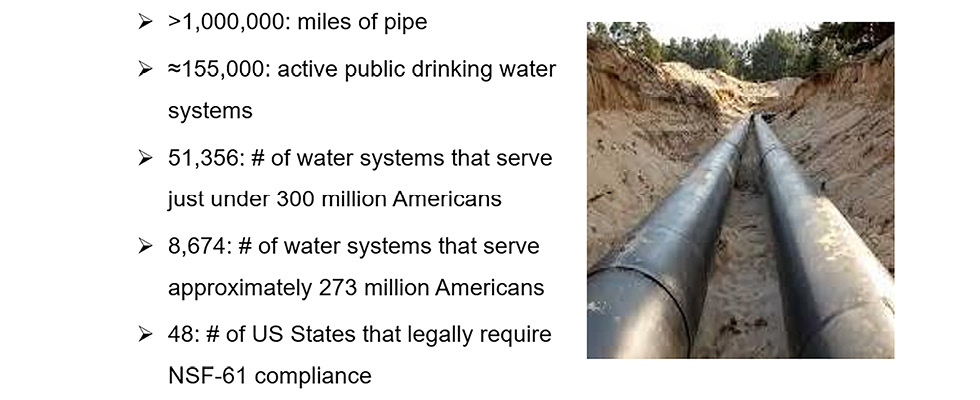
In potable water systems, the importance of maintaining safety and water quality cannot be overstated. Not only is access to clean drinking water needed, but the ability to transport it without contamination is also a must. One crucial component that plays a significant role in achieving this goal is the National Sanitation Foundation (NSF)/American National Standards Institute (ANSI)-61 certified expansion joint. NSF/ANSI-61 expansion joints are critical components in piping systems, especially those carrying potable water. These specialized joints are not only designed to meet stringent standards, but they also protect the critical components that comprise the piping system.
In discussing NSF/ANSI-61 expansion joints, it is important to first understand the certification and the process to obtain certification. NSF/ANSI-61 is a certification established by NSF International, a widely recognized third-party testing and certification organization. The NSF/ANSI-61 Drinking Water Systems Components—Health Effect is a standard that establishes minimum healthy-effect requirements for the chemical contaminants and impurities that are indirectly imparted to drinking water from products, components and materials used in drinking water systems.
For expansion joints, obtaining NSF/ANSI-61 certification is paramount to guarantee compliance with strict health and safety standards. Just utilizing NSF/ANSI-61 certified materials does not constitute compliance. The finished product must be certified through accredited labs such as NSF of Underwriters Laboratory. Expansion joints used in potable water systems must be constructed from materials that do not leach harmful substances into the water supply. NSF/ANSI-61 certification verifies the materials used in these joints meet the necessary criteria for safety and do not pose a risk to human health. This is particularly crucial in applications where the joints are in direct contact with drinking water.

Features of NSF/ANSI-61 Expansion Joints:
Corrosion resistance
Potable water systems often face the challenges of corrosion due to the nature of the fluid being transported. NSF/ANSI-61 certified expansion joints are designed and tested to resist corrosion effectively. This resistance ensures the longevity of the joints, contributing to the overall reliability and durability of the water system.
Flexibility and performance
Vibration elimination: All rotating equipment vibrates, but excessive vibration will have negative effects on pumping equipment. Designing expansion joints into potable water pumping systems will allow system operators to keep the range of vibration within acceptable limits. It is critical to properly select the expansion joints with the most optimal material composition and design for the pumping system.
Piping misalignment: Piping misalignment is a big issue, and whether this misalignment happens during piping installation or if the piping shifts over time, NSF/ANSI-61 expansion joints help to accommodate the “imperfections” found in a piping system.
Thermal growth: Thermal growth occurs when pipes expand or contract, and NSF/ANSI-61 expansion joints compensate for these changes to prevent putting undue stress on the pump. When thermal growth is allowed to put stress on a pump, the pump is at risk of mechanical seal failure or bearing problems. Acknowledging thermal growth as part of pump system operation and addressing it with NSF/ANSI-61 expansion joints means proactively ensuring a healthy life span for pumps.
Installation considerations
Proper installation is also crucial to the performance of expansion joints in potable water systems. Following manufacturer guidelines and industry best practices during installation is essential to maintaining the integrity of the joints and ensuring they function as intended. NSF/ANSI-61 certification provides confidence to engineers, contractors and water authorities that the expansion joints have undergone rigorous testing and are suitable for use in drinking water applications.
Compliance with regulatory standards
Companies that achieve the NSF/ANSI-61 certification must conduct annual testing and factory compliance in order to maintain their certification. Regulatory bodies often set stringent standards for materials and products used in potable water systems. NSF/ANSI-61 certification serves as evidence that expansion joints adhere to these standards. This compliance not only ensures the safety of the water supply but also simplifies the approval process for projects involving potable water infrastructure.
NSF/ANSI-61 certified expansion joints are a cornerstone in the construction and maintenance of potable water systems. By prioritizing material safety, corrosion resistance, flexibility and compliance with regulatory standards, these expansion joints contribute to the overall safety and reliability of drinking water infrastructure. Engineers and decision-makers can be confident in choosing NSF/ANSI-61 certified expansion joints to safeguard the quality of water.
We invite your suggestions for article topics as well as questions on sealing issues so we can better respond to the needs of the industry. Please direct your suggestions and questions to sealingsensequestions@fluidsealing.com.


